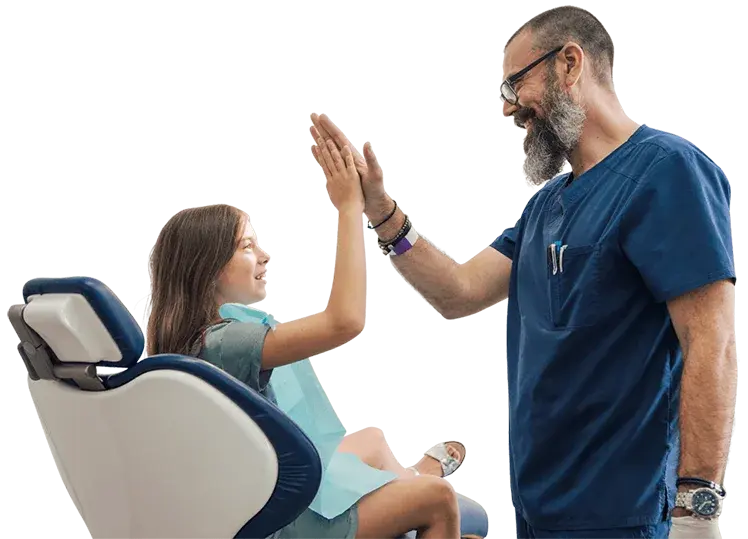Safe, Comfortable, and Easy Pediatric Dental Care in Dover, New Hampshire
We provide dental care for all children, including those who need a little extra time and attention, in a professional, comfortable atmosphere.

Why Pediatric Dentistry?
Regular dental care ensures that your child’s smile stays healthy through the years. Establishing a dental home for your child allows you to teach preventative dental health habits that protect your child from dental/oral disease. Here are some important things to know about pediatric dentistry:
- New research suggests a link between dental health and overall health, making it even more critical to develop good habits at a young age.
- Pediatric dentistry is comprehensive dental care that focuses on the prevention, early detection, and treatment of dental diseases.
Pediatric dentists (pedodontists) must complete an additional two years of specialty training in child psychology after completing the required four years of dental school. This specialized program of study and hands-on experience prepares pediatric dentists to meet the unique needs of infants, children, and adolescents, including people with special healthcare needs.
What to Expect
Our pediatric dentist and dental team will treat your children as they grow and continue to treat your family like ours.
BeforeTreatment
Our goal is to provide a positive experience through comprehensive dental care for infants, children, and adolescents in a friendly and safe environment, focusing on prevention and education. We will always do our best to make sure that your child is comfortable in a dental setting, working to ensure that the common fear of the dentist isn't something you'll have to worry about. Talking with your child about going to the dentist is always a great idea before their first dental treatment.
DuringTreatment
With the latest equipment and materials, including digital x-rays, which minimize radiation exposure, to our warm, welcoming environment, our pediatric dental services ensure that your child has the best dental and oral care experience possible. Some of our pediatric dentistry services include:
- Oral health
- Cleanings
- Fluoride treatments
- Dental sealants
- Digital x-rays
- Tooth-colored fillings
- Anticipatory guidance
- Nutrition and diet counseling
- Crowns
- Orthodontics
- Emergency care, including tooth pain relief and trauma management
AfterTreatment
Your First Visit
During the first visit and every dental visit, your child is treated with kindness and patience. We build a personal relationship with your child to lay a foundation for good oral hygiene habits. We believe that trust and a positive attitude towards dental health begin on the first visit while we learn about your child’s needs and previous dental experience. Our dental team understands that every child is different, and we tailor our approach accordingly.
Modern Dentistry
You can find all the latest technology at our Dover, NH offices.Judgment-Free Office
We're here to help you feel confident in your smile. We provide a safe, judge-free zone for any dental issue or concern you have.On Your Schedule
Taking care of your dental health should fit within your schedule. We are open late and on weekends so you can get the care you need.Insurance
and Financing










No Insurance?
No Problem.
Making An Appointment Is Easy





If JD Howard is your dentist you already know about everything I've written - if you aren't a client yet, what are you waiting for?





FAQ
Frequently Asked Questions
Treatment with fluoride is an effective way to strengthen your tooth's enamel. It takes a few minutes to apply a fluoridated varnish or gel that has a higher concentration of fluoride than over-the-counter products. Your hygienist can apply the product with a soft brush. After application, you should not brush or floss for 4 to 6 hours afterward, and not eat for a few hours. Drinking can resume immediately. The American Dental Association recommends fluoride treatments for adults as well as children. Speak to your dentist about how fluoride can help you achieve optimal dental health.
Fluoride varnish is applied with a soft brush and you will not be able to eat or drink for a few hours afterward. A fluoride gel takes 4 minutes to be applied, and you should avoid eating and drinking for 30 minutes after treatment.
The timing for baby teeth differs for each individual but all 20 baby teeth are usually in by 3 years of age. The American Academy of Pediatric Dentistry (AAPD) recommends that a child goes to the dentist by age 1 or within six months after the first tooth erupts. Primary teeth typically begin growing at around six months of age. Baby teeth are just as susceptible to cavities as adult teeth. If a baby tooth is lost early, the permanent teeth can drift into the empty space and make it difficult for other adult teeth to find room. Proper oral hygiene is essential as soon as your baby is born and it is critical to establish good oral health habits early.